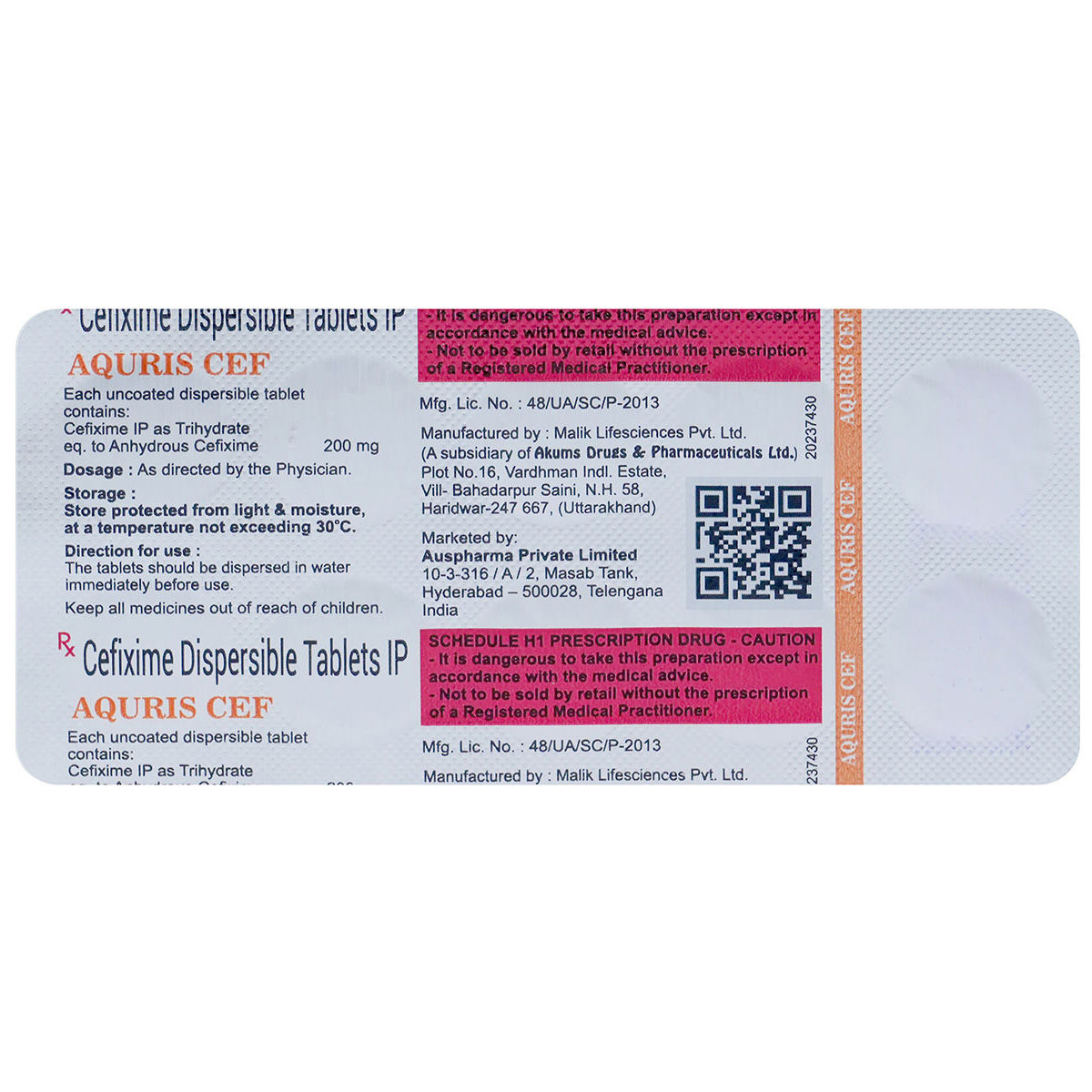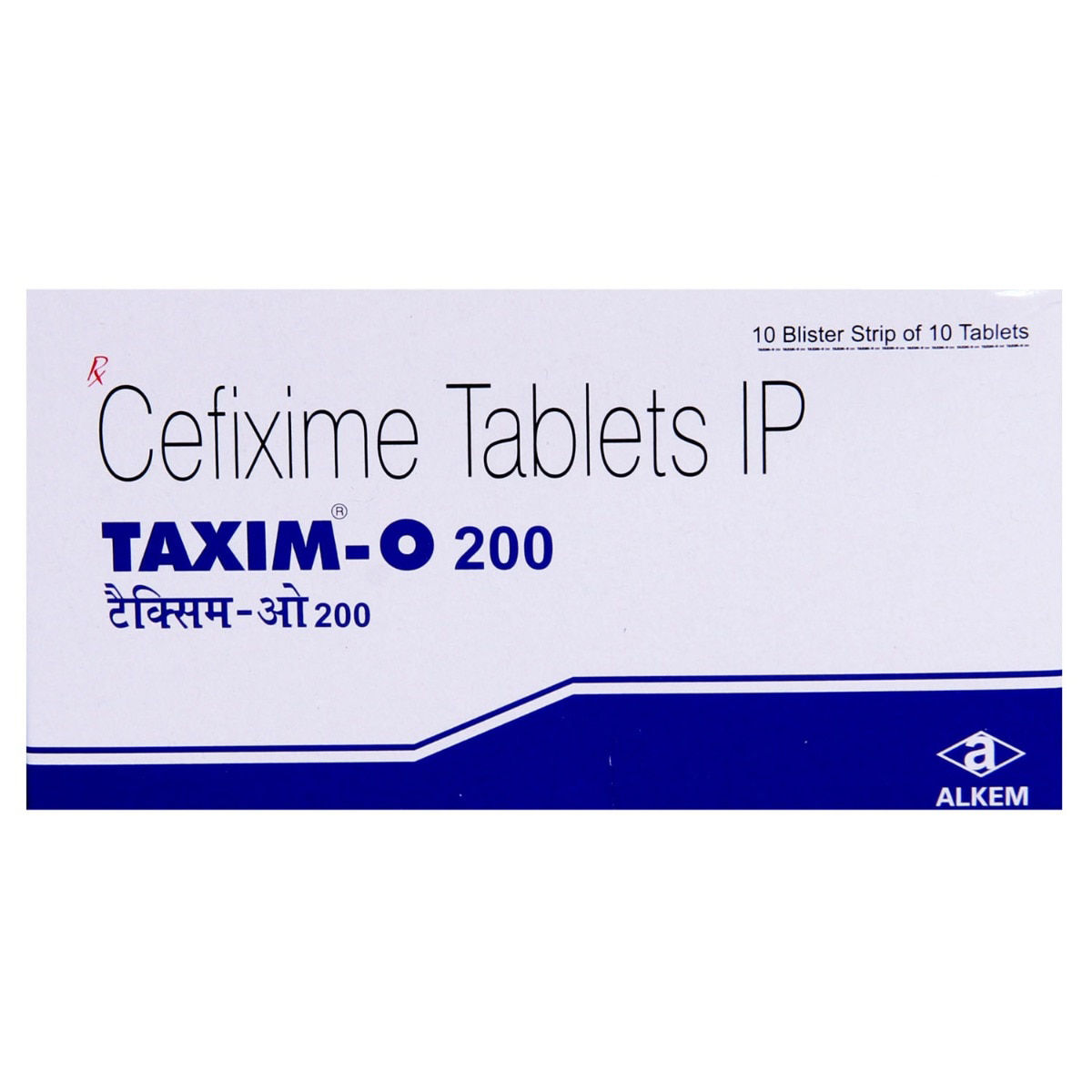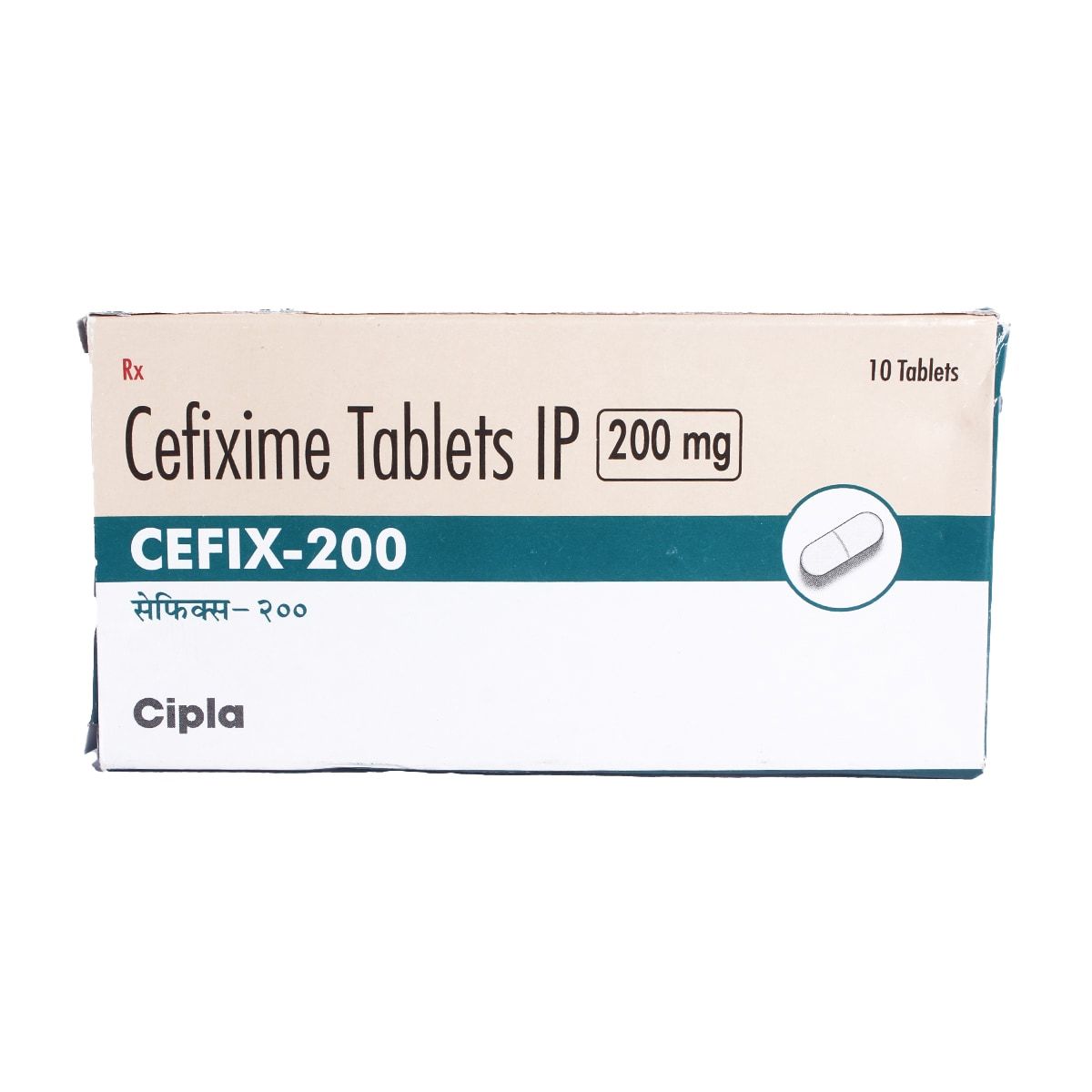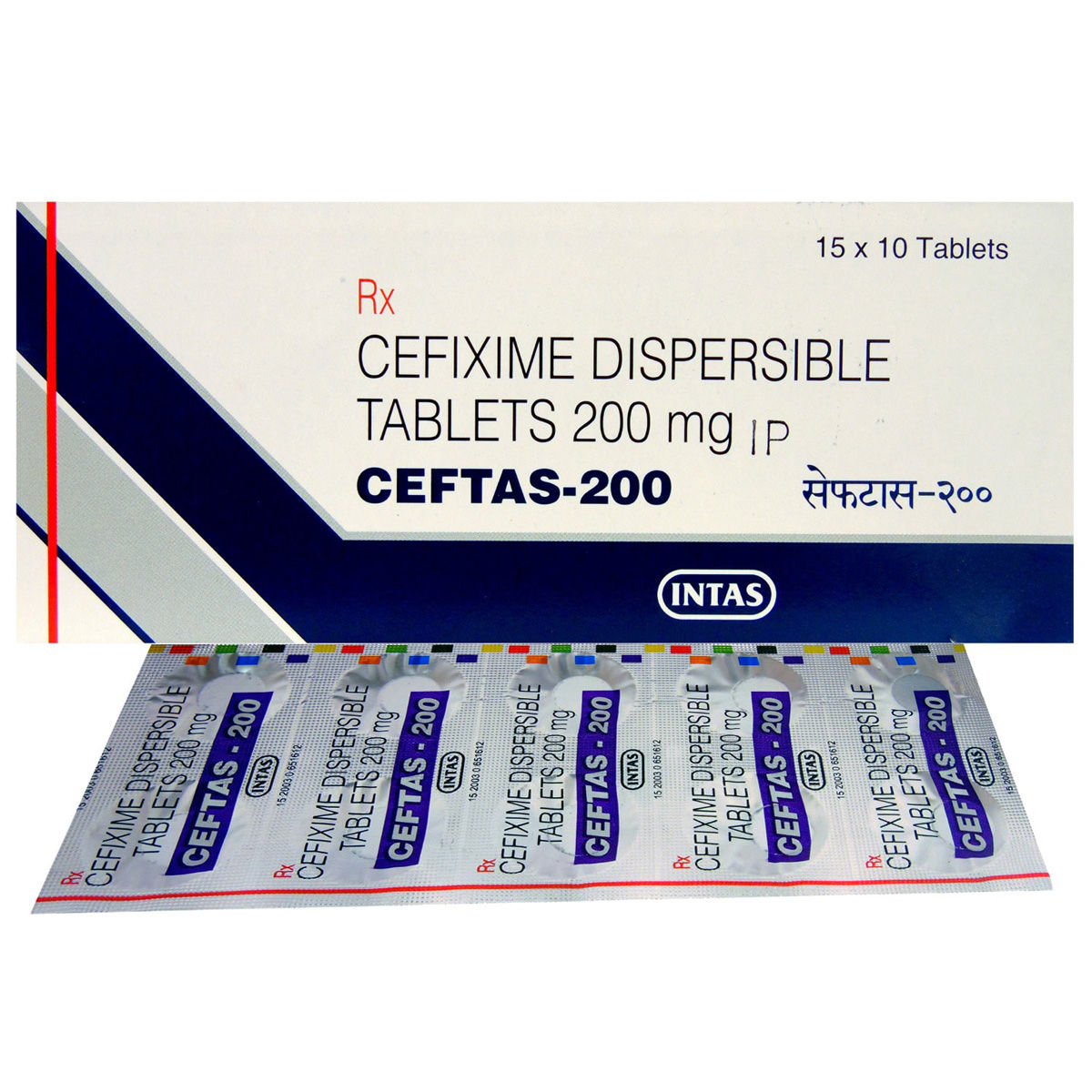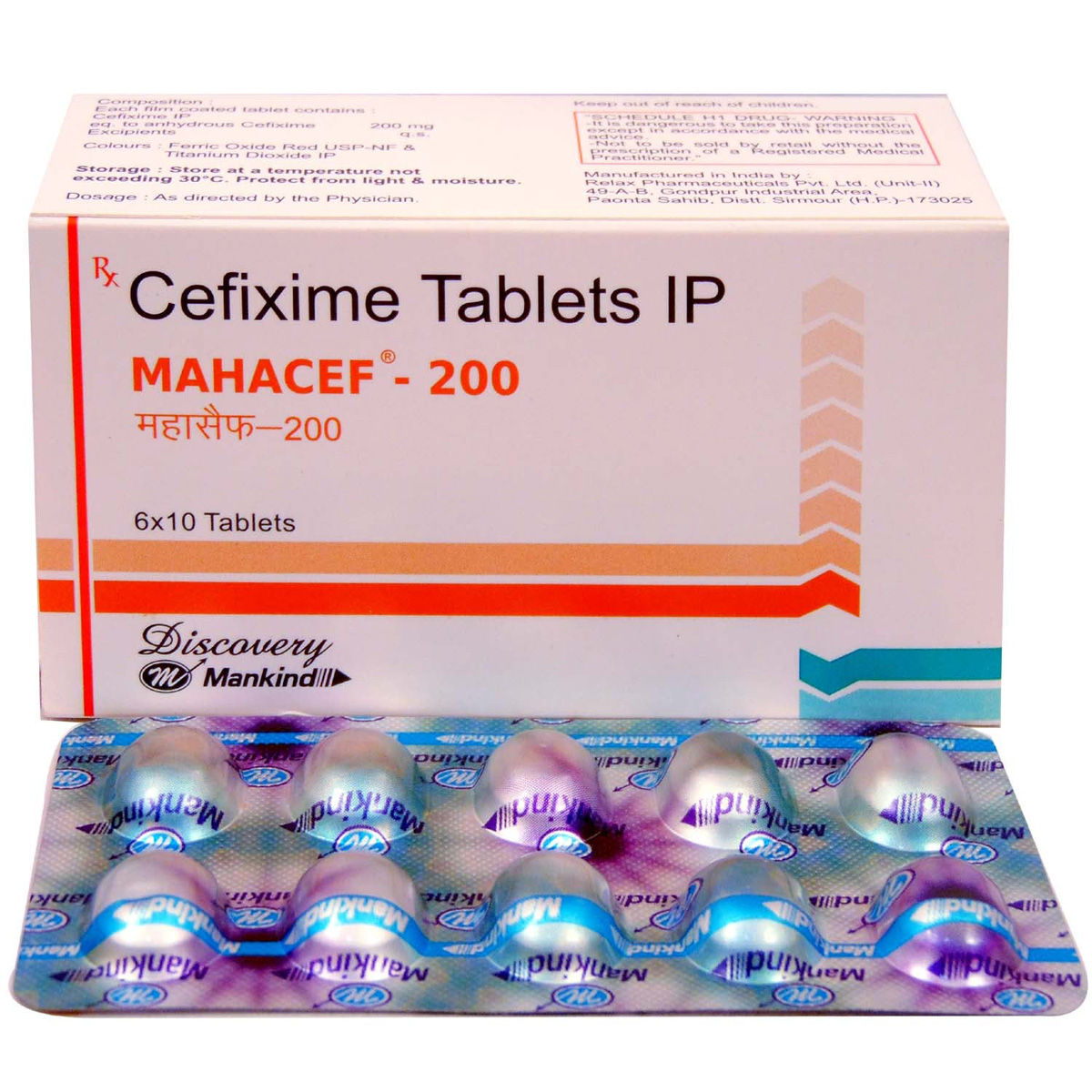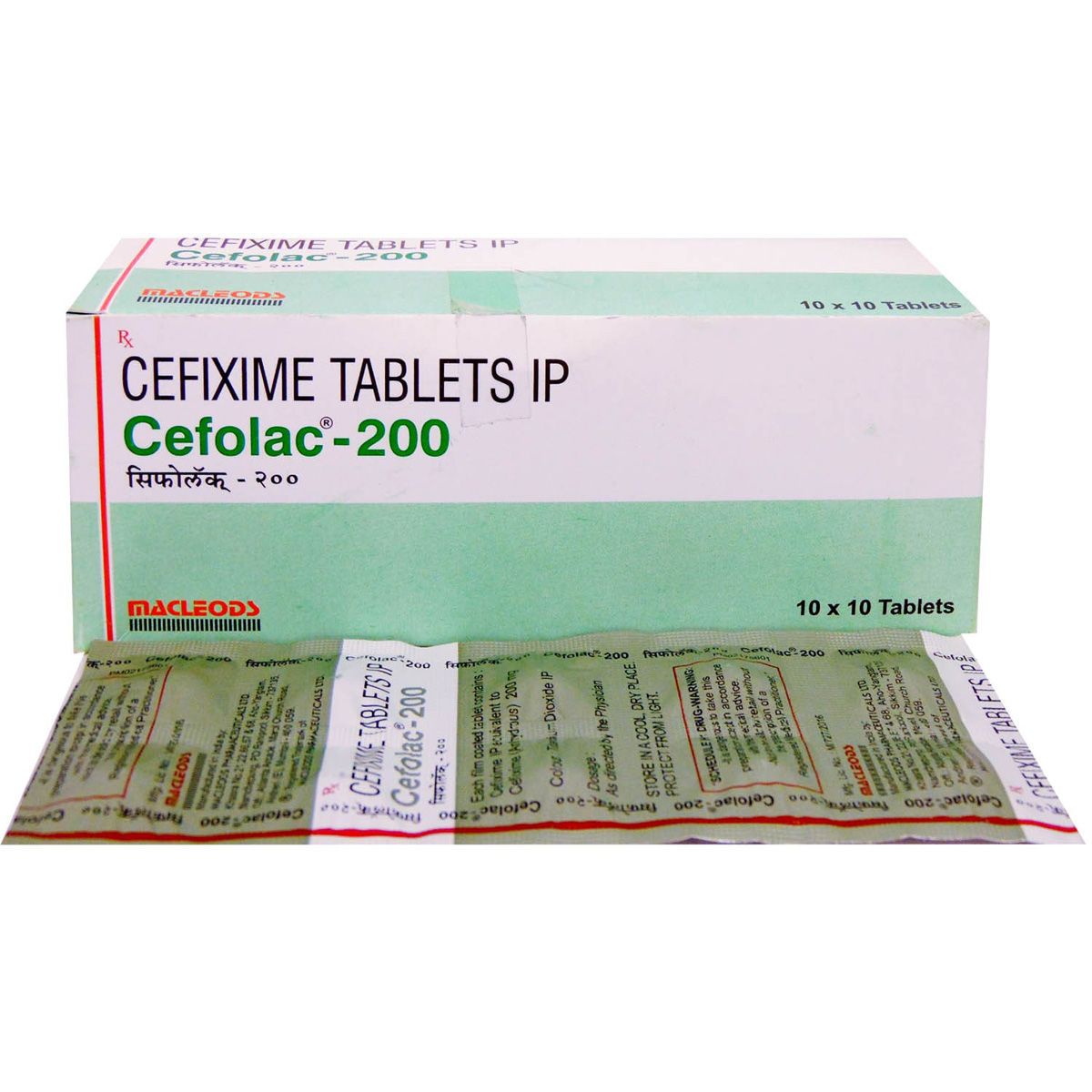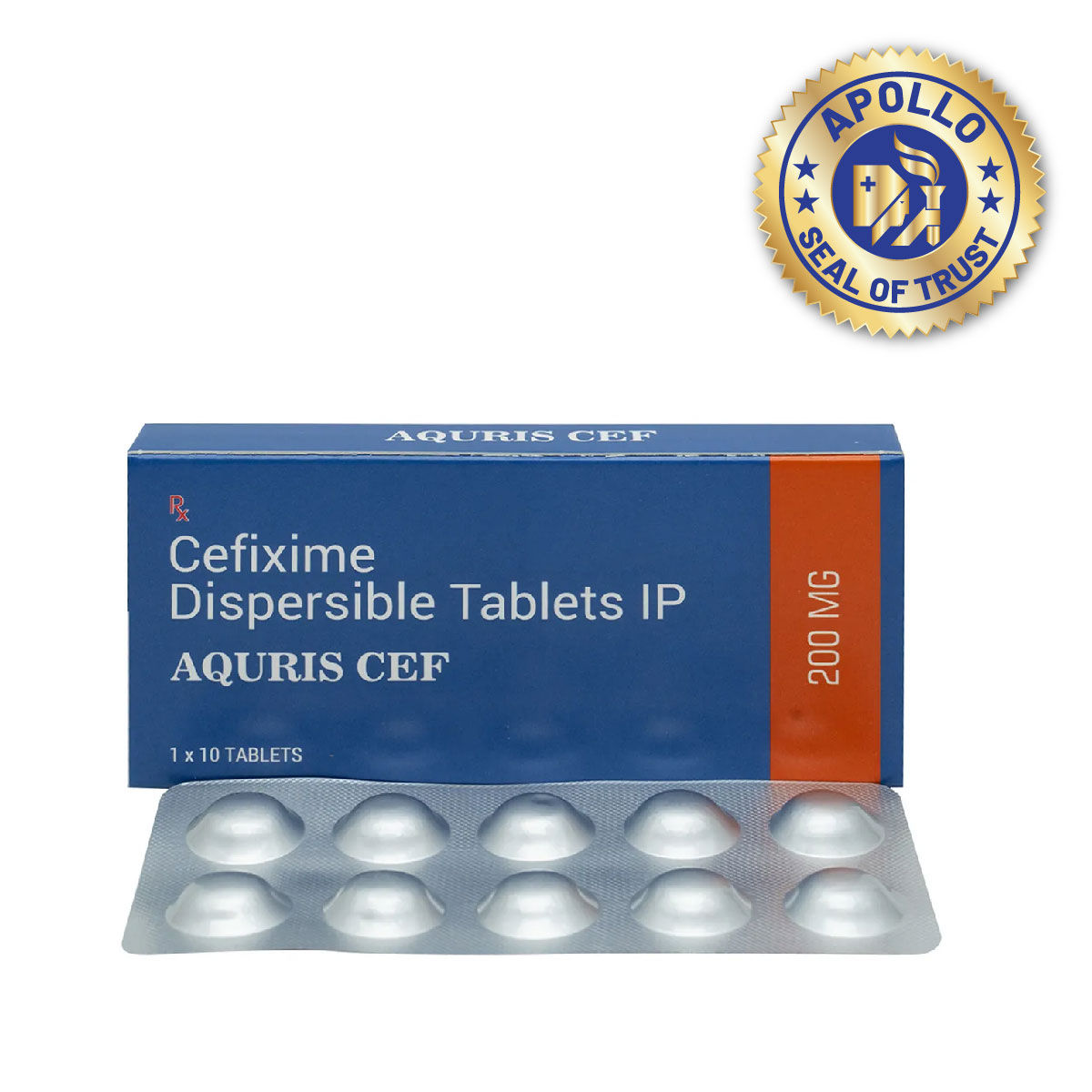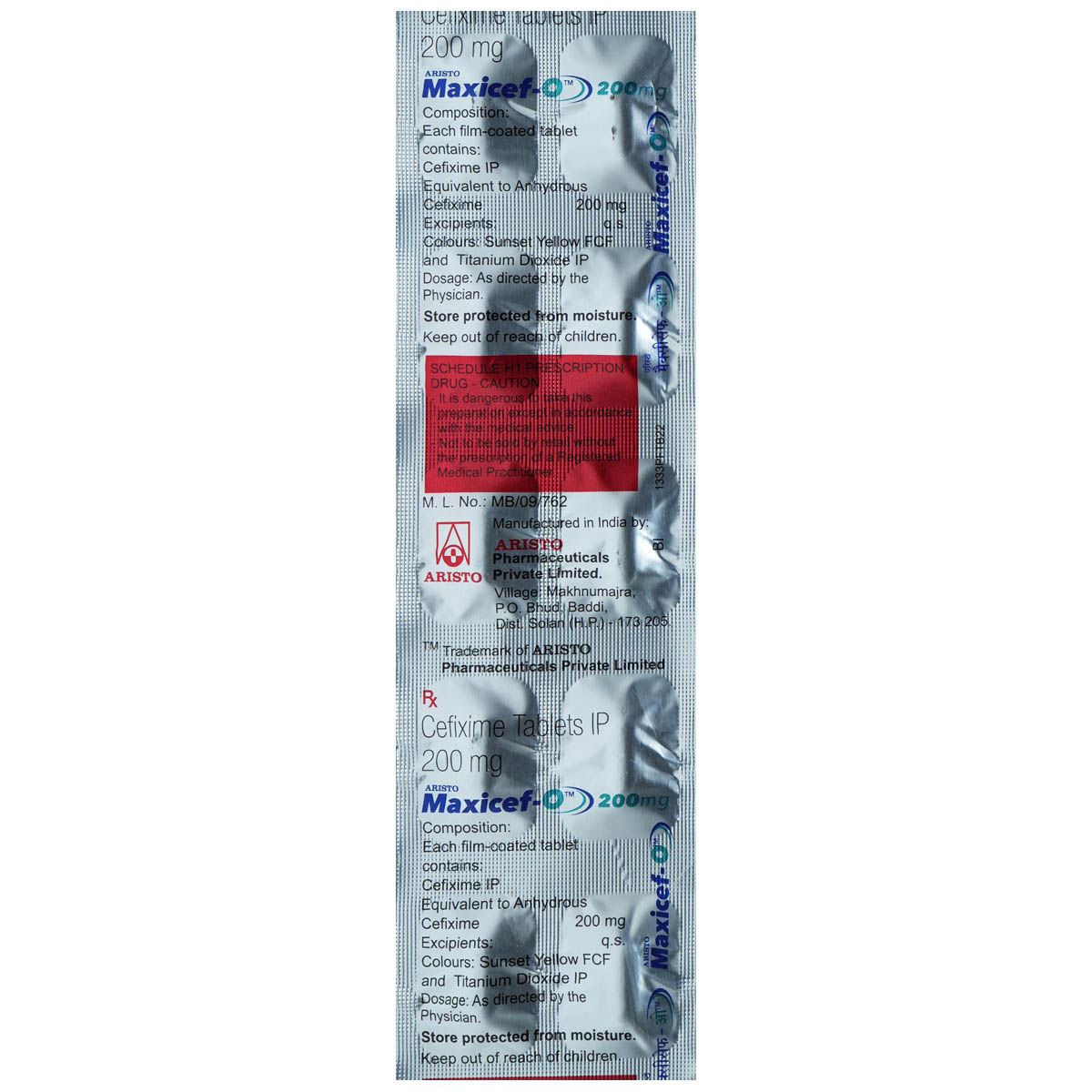Antibact 200 mg Tablet 10's

₹91.1
(Inclusive of all Taxes)
₹13.7 Cashback (15%)
Antibact 200 mg Tablet is used to treat bacterial infections of the ear, nose, sinuses (sinusitis), throat (tonsillitis, pharyngitis), chest and lungs (bronchitis, pneumonia) and urinary system (cystitis and kidney infections). Additionally, it is also prescribed to treat uncomplicated gonorrhoea (cervical/urethral). It contains Cefixime, which weakens and destroys the bacterial cell wall, leading to death. As a result, it helps to treat bacterial infections. Sometimes, you may experience common side effects such as diarrhoea, nausea, loose stools, abdominal pain, dyspepsia, indigestion, and vomiting. Before taking this medicine, you should tell your doctor if you are allergic to any of its components or if you are pregnant/breastfeeding, and about all the medications you are taking and pre-existing medical conditions.
Know Your Delivery Time
Provide Delivery Location
 Prescription drug
Prescription drugWhats That

Secure Payment

India's Most Trusted Pharmacy

Genuine Products
Composition :
Manufacturer/Marketer :
Consume Type :
Return Policy :
Expires on or after :
NPPA :
About Antibact 200 mg Tablet
Antibact 200 mg Tablet is used to treat susceptible organisms (bacteria)-caused infections of the ear, nose, sinuses (sinusitis), throat (tonsillitis, pharyngitis), chest and lungs (bronchitis, pneumonia) and urinary system (cystitis and kidney infections). Additionally, it is also prescribed to treat uncomplicated gonorrhoea (cervical/urethral).
Antibact 200 mg Tablet contains Cefixime, which works by inhibiting cell wall synthesis. In turn, Antibact 200 mg Tablet weakens and destroys the bacterial cell wall, leading to death. As a result, Antibact 200 mg Tablet helps to treat bacterial infections.
Take Antibact 200 mg Tablet as directed by the physician. Sometimes, you may experience common side effects such as diarrhoea, nausea, loose stools, abdominal pain, dyspepsia, indigestion, and vomiting. Most of these side effects do not require medical attention and resolve gradually over time. However, you are advised to talk to your doctor if you experience these side effects persistently.
Do not take Antibact 200 mg Tablet if you are allergic to cefixime, other cephalosporin antibiotics, or any other ingredients of this medicine. Before starting the Antibact 200 mg Tablet , please inform your doctor if you have colitis (inflammation of the colon's inner lining), renal dysfunction, liver disease, and seizure disorders. Do not take this medicine on your own as self-medication may lead to antibiotic resistance in which antibiotics fail to act against specific bacterial infections. If you are pregnant or breastfeeding, think you may be pregnant, or are planning to have a baby, ask your doctor for advice before taking the Antibact 200 mg Tablet . Drive only if you are alert, as Antibact 200 mg Tablet may cause dizziness.
Uses of Antibact 200 mg Tablet
Antibact 200 mg Tablet is used in the treatment of Bacterial Infections. The detailed uses of Antibact 200 mg Tablet are as follows:
- Treatment of Bacterial Infections: Antibact 200 mg Tablet is widely used to combat bacterial infections such as respiratory tract infections and urinary tract infections. It functions by inhibiting bacterial growth, aiding recovery.
- Management of Otitis Media: Antibact 200 mg Tablet may be prescribed for otitis media, a middle ear infection common in children, to alleviate pain and discomfort associated with the condition.
- Treatment of Sinusitis: Antibact 200 mg Tablet proves effective in treating sinusitis, which involves inflammation of the sinus cavities caused by bacterial infections. It helps relieve symptoms such as nasal congestion and pressure.
- Gonorrhea Treatment: Sometimes, Antibact 200 mg Tablet is used to treat gonorrhea, a sexually transmitted infection caused by the Neisseria gonorrhoeae bacteria. This use is usually a part of a dual therapy approach.
Directions for Use
- Antibact 200 mg Tablet can be taken with or without food or as advised by your doctor.
- Follow your doctor's instructions on the dosage and timing of this medication.
- Swallow Antibact 200 mg Tablet as a whole with a glass of water.
- Do not crush, break, or chew it.
Medicinal Benefits
Antibact 200 mg Tablet is a short-term medication for a wide range of bacterial infections. It prevents the growth of bacteria by stopping the formation of a protective covering, which is vital for its growth. It prevents and treats bacterial infections like ear, nose, sinuses (sinusitis), throat (tonsillitis, pharyngitis), chest and lungs (bronchitis, pneumonia) and urinary system (cystitis and kidney infections). Additionally, it is also prescribed to treat uncomplicated gonorrhoea (cervical/urethral).
How Antibact 200 mg Tablet Works
Storage
- Drink water or other clear fluids.
- To prevent worsening of pain, limit intake of tea, coffee, or alcohol.
- Include bland foods like rice, toast, crackers, and rice in your diet.
- Avoid lying down immediately after eating as it may cause indigestion or heartburn.
- Avoid acidic and spicy food as it may cause indigestion.
- Chest pain may last for a while and needs immediate medical attention as it is a significant health issue to be attended to.
- Take rest and refrain from doing physical activity for a while, and restart after a few days.
- Try applying an ice pack to the strained area for at least 20 minutes thrice a day. Ice pack thus helps reduce inflammation.
- Sit upright and maintain proper posture if there is persistent chest pain. • Use extra pillows to elevate your position and prop your chest up while sleeping.
- Inform your doctor about dry mouth symptoms. They may adjust your medication regimen or prescribe additional medications to manage symptoms.
- Drink plenty of water throughout the day to help keep your mouth moist and alleviate dry mouth symptoms.
- Chew sugar-free gum or candies to increase saliva production and keep your mouth moisturized.
- Use saliva substitutes, such as mouthwashes or sprays, only if your doctor advises them to help moisturize your mouth and alleviate dry mouth symptoms.
- Avoid consuming smoking, alcohol, spicy or acidic foods, and other irritants that may aggravate dry mouth symptoms.
- Schedule regular dental check-ups to keep track of your oral health and handle any dry mouth issues as they arise.
- Regularly brush and floss your teeth.
- Rinse your mouth with water and baking soda a solution to neutralize acid in the mouth. This makes your food taste as it should.
- Drink plenty of water or non-caffeinated drinks to prevent dry mouth which may lead to altered taste.
- Try ginger, peppermint, fruit or green teas, lemonade, ginger ale or fruit juice to help mask unpleasant tastes.
- Try sucking on sugar-free ice pops or ice cubes to prevent dry mouth.
- Rest well; get enough sleep.
- Eat a balanced diet and drink enough water.
- Manage stress with yoga and meditation.
- Limit alcohol and caffeine.
- Physical activities like walking or jogging might help boost energy and make you feel less tired.
- Wear cotton underwear and loose pants to facilitate better airflow.
- Try meditation and yoga to reduce stress and improve balance hormones.
- Eat foods like yogurt or kefir to support vaginal health.
- Gently clean the genital area with soap and lukewarm water.
- Avoid fragrant soap, bubble baths, and douches; these can also irritate.
- Tell your doctor about any medications or supplements you’re taking, as they may affect vaginal discharge treatments.
What if I have taken an overdose of Antibact 200 mg Tablet
Drug Warnings
Antibact 200 mg Tablet has occasionally been associated with hypersensitive reactions that result in shock and mortality. If a reaction happens, stop using it. Do not take Antibact 200 mg Tablet if you are allergic to Cefixime or other cephalosporin antibiotics, or any of the other ingredients of this medicine. Talk to the doctor before taking Antibact 200 mg Tablet if you have seizures, liver or renal dysfunction, heart disorder, and inflammation of the colon's inner lining (colitis). Do not take Antibact 200 mg Tablet without first consulting the doctor if you are pregnant, planning for pregnancy or breastfeeding. Drive only if you are alert as Antibact 200 mg Tablet may cause dizziness. Antibact 200 mg Tablet may interact with certain tests such as glucose (sugar) in urine and give unusual results. Therefore, inform the doctor that you are using Antibact 200 mg Tablet before undergoing any tests.
Drug-Drug Interactions
Drug-Drug Interactions
Login/Sign Up
Coadministration of Antibact 200 mg Tablet with Thioridazine can increase the risk or severity of irregular heart rhythms.
How to manage the interaction:
Taking Antibact 200 mg Tablet with Thioridazine together is generally avoided as it can result in an interaction, it can be taken if your doctor has advised it. However, if you experience sudden dizziness, lightheadedness, fainting, shortness of breath, chest pain or tightness, rapid heartbeat, or memory loss, contact a doctor immediately. Do not discontinue any medications without consulting a doctor.
Coadministration of Antibact 200 mg Tablet with Cisapride can increase the risk or severity of irregular heart rhythms.
How to manage the interaction:
Taking Antibact 200 mg Tablet with Cisapride together can result in an interaction, it can be taken if your doctor has advised it. However, if you experience sudden dizziness, lightheadedness, fainting, shortness of breath, chest pain or tightness, rapid heartbeat, or memory loss, contact a doctor immediately. Do not discontinue any medications without consulting a doctor. Note: Cisapride is no longer available on the market. Cisapride should only be taken if prescribed by a doctor and closely monitored.
Coadministration of Antibact 200 mg Tablet with Saquinavir can increase the risk or severity of irregular heart rhythms.
How to manage the interaction:
Taking Antibact 200 mg Tablet with Saquinavir together is generally avoided as it can result in an interaction, it can be taken if your doctor has advised it. However, if you experience sudden dizziness, lightheadedness, fainting, shortness of breath, chest pain or tightness, rapid heartbeat, or memory loss, contact a doctor immediately. Do not discontinue any medications without consulting a doctor.
Coadministration of Antibact 200 mg Tablet with Ziprasidone can increase the risk or severity of irregular heart rhythm.
How to manage the interaction:
Taking Antibact 200 mg Tablet with Ziprasidone together can result in an interaction, it can be taken if your doctor has advised it. However, if you experience sudden dizziness, lightheadedness, fainting, shortness of breath, chest pain or tightness, rapid heartbeat, or memory loss, contact a doctor immediately. Do not discontinue any medications without consulting a doctor.
Coadministration of Antibact 200 mg Tablet with Quinidine can increase the risk or severity of irregular heart rhythms.
How to manage the interaction:
Taking Antibact 200 mg Tablet with Quinidine together is generally avoided as it can result in an interaction, it can be taken if your doctor has advised it. However, if you experience sudden dizziness, lightheadedness, fainting, shortness of breath, chest pain or tightness, rapid heartbeat, or memory loss, contact a doctor immediately. Do not discontinue any medications without consulting a doctor.
Using Mesoridazine together with Antibact 200 mg Tablet can increase the risk of an irregular heart rhythm that may be serious.
How to manage the interaction:
Taking Mesoridazine with Antibact 200 mg Tablet is not recommended, please consult your doctor before taking it. You should seek immediate medical attention if you develop sudden dizziness, lightheadedness, fainting, shortness of breath, or heart palpitations. Do not stop using any medications without talking to a doctor.
The combination of Amiodarone and Antibact 200 mg Tablet may significantly increase the risk of an abnormal heart rhythm.
How to manage the interaction:
Although Amiodarone and Antibact 200 mg Tablet interact, it can be taken if prescribed by a doctor. If you get dizziness, lightheadedness, fainting, or fast or racing heartbeats, consult a doctor. Do not stop taking any medications without consulting a doctor.
Using bepridil together with Antibact 200 mg Tablet drugs can increase the risk of an irregular heart rhythm that may be serious.
How to manage the interaction:
Taking Antibact 200 mg Tablet with Bepridil can cause an interaction, please consult your doctor before taking it. You should seek immediate medical attention if you develop sudden dizziness, lightheadedness, fainting, or fast or pounding heartbeats. Do not stop using any medications without consulting a doctor.
Coadministration of Antibact 200 mg Tablet with Pimozide can increase the risk or severity of irregular heart rhythms.
How to manage the interaction:
Taking Antibact 200 mg Tablet with Pimozide together can result in an interaction, it can be taken if your doctor has advised it. However, if you experience sudden dizziness, lightheadedness, fainting, shortness of breath, chest pain or tightness, rapid heartbeat, or memory loss, contact a doctor immediately. Do not discontinue any medications without consulting a doctor.
Coadministration of Antibact 200 mg Tablet with Sotalol can increase the risk or severity of irregular heart rhythms.
How to manage the interaction:
Taking Antibact 200 mg Tablet with Sotalol together is generally avoided as it can result in an interaction, it can be taken if a doctor has advised it. If you experience sudden dizziness, lightheadedness, fainting, shortness of breath, chest pain or tightness, rapid heartbeat, or memory loss, contact a doctor. Do not discontinue any medications without consulting a doctor.
Drug-Food Interactions
Drug-Food Interactions
Login/Sign Up
Avocado, Beetroot, Cereals, Cheese, Chicken, Black Beans, Eggs, Clams, Chickpea, Whole Grains, Shellfish, Spinach, Salmon, Red Meat, Oysters, Potatoes, Kidney Beans, Mackerel, Milk, Kale, Tuna, Yogurt, Liver, Low-Fat Milk, Trout, Fortified Breakfast Cereal, Fish, Beef
How to manage the interaction:
Antibact 200 mg Tablet and a multivitamin with minerals should not be taken together orally. Products containing magnesium, aluminium, calcium, iron, or other minerals may decrease the effects of Antibact 200 mg Tablet. If at all possible, avoid taking multivitamins containing minerals while receiving Antibact 200 mg Tablet treatment. Do not discontinue any medications without first consulting your doctor.
Diet & Lifestyle Advise
After taking the full course of Antibact 200 mg Tablet , probiotics should be taken to restore some of the healthy bacteria in the intestines that may have been killed. Taking probiotics after antibiotic treatment can reduce the risk of antibiotic-associated diarrhoea. Certain fermented foods like yoghurt, cheese, sauerkraut, kombucha and kimchi can help restore the intestine's good bacteria.
Include more fibre-enriched food in your diet, as it can be easily digested by gut bacteria, which helps stimulate their growth. Thus, fibre foods may help restore healthy gut bacteria after a course of antibiotics. Whole grains like whole-grain bread and brown rice should be included in your diet.
Avoid taking too much calcium, iron-enriched foods and drinks as it might affect the working of Antibact 200 mg Tablet .
Avoid alcoholic beverages with Antibact 200 mg Tablet as it can dehydrate and affect your sleep. this can make it harder for your body to aid the Antibact 200 mg Tablet in fighting off infections.
Habit Forming
Therapeutic Class
Product Substitutes
Alcohol
Caution
It is unknown whether Antibact 200 mg Tablet interacts with alcohol. However, as a precautionary measure, it is advisable not to take or limit alcohol.
Pregnancy
Caution
Antibact 200 mg Tablet should not be used during pregnancy unless clearly necessary. Your doctor will weigh the benefits and potential risks before prescribing it. Please consult your doctor.
Breast Feeding
Unsafe
Antibact 200 mg Tablet should be administered to nursing mothers only if the benefits of therapy are judged to outweigh the potential risks to the infant. Hence it is best to consult a doctor before taking the Antibact 200 mg Tablet .
Driving
Caution
Caution should be exercised; Antibact 200 mg Tablet usually causes drowsiness and confusion, affecting driving ability.
Liver
Caution
Antibact 200 mg Tablet to be taken with caution, especially if you have a history of liver diseases/conditions. The dose may have to be adjusted by your doctor.
Kidney
Caution
Antibact 200 mg Tablet to be taken with caution, especially if you have a history of Kidney diseases/conditions. The dose may have to be adjusted by your doctor.
Children
Caution
Antibact 200 mg Tablet to be taken with caution, especially if you are children below 12. Your doctor may adjust your dose depending upon your age.

Have a query?
FAQs
Antibact 200 mg Tablet is used to treat bacterial infections of the ear, nose, sinuses, throat, chest, lungs and urinary system. Additionally, it is also used to treat uncomplicated gonorrhoea (cervical/urethral).
Antibact 200 mg Tablet comprises Cefixime. The bactericidal action of Cefixime is due to the inhibition of cell wall synthesis. In turn, the Antibact 200 mg Tablet weakens and destroys the bacterial cell wall, leading to death. As a result, Antibact 200 mg Tablet helps to treat bacterial infections.
Antibact 200 mg Tablet can cause diarrhoea, which may be a sign of a new infection. If you have diarrhoea that is watery or bloody, call your doctor. Do not use anti-diarrhoea medicine unless your doctor tells you to.
If you forget to take Antibact 200 mg Tablet , take your dose as soon as possible. If it is almost time for the next dose, just skip that dose and take the next one when it is due. If in doubt, please contact your doctor. Do not take a double dose to make up for a forgotten dose.
Yes, Treating urinary tract infection (UTI) by Antibact 200 mg Tablet may be a good alternative. However, it should be taken under the supervision of the healthcare professional.
Antibact 200 mg Tablet is active against a very wide spectrum of bacteria such as Staphylococcus aureus, Streptococcus pneumoniae, Streptococcus pyogenes (the cause of strep throat), Hemophilus influenzae, Moraxella catarrhalis, E. coli, Klebsiella, Proteus mirabilis, Salmonella, Shigella, and Neisseria gonorrhoeae.
No, It does not treat colds, flu, or other virus infections. It is meant for only specific bacterial infections.
Antibact 200 mg Tablet was effective in the treatment of bacterial sinus infections in adults and was well tolerated.
No, it is a prescribed drug given by a physician to prevent specific medical conditions. Taking it on your own can cause unwanted side effects.
Antibact 200 mg Tablet may alter certain laboratory test results like glucose (sugar) in the urine. Inform your doctor before undergoing the above test.
Talk to the doctor before taking Antibact 200 mg Tablet if you have seizures, liver or renal dysfunction, heart disorder, and inflammation of the colon's inner lining (colitis). Do not take Antibact 200 mg Tablet without first consulting the doctor if you are pregnant, planning for pregnancy or breastfeeding.
Yes, Antibact 200 mg Tablet is safe and effective if take in the dose and duration prescribed by the doctor.
Antibact 200 mg Tablet should be taken for as long as it has been prescribed by the doctor. The doctor will determine the duration of the treatment based on your condition.
Consult the doctor if you do not get better after using Antibact 200 mg Tablet for the prescribed duration.
If you miss a dose of Antibact 200 mg Tablet take it as soon as you remember. However, if it is almost time for the scheduled dose, skip the missed dose and take the next dose at the scheduled time.
Antibact 200 mg Tablet to be taken with caution, especially if you have a history of kidney diseases/conditions. The dose may have to be adjusted by your doctor.
Antibact 200 mg Tablet can be taken with or without food.
Sometimes, Antibact 200 mg Tablet may cause side effects such as diarrhoea, nausea, loose stools, abdominal pain, dyspepsia, indigestion, and vomiting. Most of these side effects do not require medical attention and resolve gradually over time. However, you are advised to talk to your doctor if you experience these side effects persistently.
Do not discontinue Antibact 200 mg Tablet without consulting your doctor. To treat your condition effectively, keep taking Antibact 200 mg Tablet for the prescribed duration.
Country of origin
Manufacturer/Marketer address
Disclaimer
Author Details
We provide you with authentic, trustworthy and relevant information
Buy best Infections & Infestation products by
Cipla Ltd
Macleods Pharmaceuticals Ltd
Alkem Laboratories Ltd
Lupin Ltd
Abbott India Ltd
Sun Pharmaceutical Industries Ltd
Mankind Pharma Pvt Ltd
Aristo Pharmaceuticals Pvt Ltd
Micro Labs Ltd
Intas Pharmaceuticals Ltd
FDC Ltd
Glenmark Pharmaceuticals Ltd
Ipca Laboratories Ltd
Zydus Healthcare Ltd
Torrent Pharmaceuticals Ltd
Leeford Healthcare Ltd
United Biotech Pvt Ltd
Zuventus Healthcare Ltd
Emcure Pharmaceuticals Ltd
Biochem Pharmaceutical Industries Ltd
Hetero Drugs Ltd
Dr Reddy's Laboratories Ltd
Alembic Pharmaceuticals Ltd
Indoco Remedies Ltd
Zydus Cadila
Cadila Healthcare Ltd
Fusion Health Care Pvt Ltd
Wockhardt Ltd
Morepen Laboratories Ltd
GlaxoSmithKline Pharmaceuticals Ltd
AAA Pharma Trade Pvt Ltd
Cadila Pharmaceuticals Ltd
Elder Pharmaceuticals Ltd
Blue Cross Laboratories Pvt Ltd
Hetero Healthcare Pvt Ltd
Converge Biotech Pvt Ltd
Capital Pharma
Gufic Bioscience Ltd
Alniche Life Sciences Pvt Ltd
Medishri Healthcare Pvt Ltd
Corona Remedies Pvt Ltd
Apex Laboratories Pvt Ltd
Mylan Pharmaceuticals Pvt Ltd
Pfizer Ltd
Vasu Organics Pvt Ltd
Wallace Pharmaceuticals Pvt Ltd
Veritaz Healthcare Ltd
Akumentis Healthcare Ltd
Koye Pharmaceuticals Pvt Ltd
Hegde & Hegde Pharmaceutica Llp
Laborate Pharmaceuticals India Ltd
Shreya Life Sciences Pvt Ltd
Overseas Health Care Pvt Ltd
Unifaith Biotech Pvt Ltd
Klm Laboratories Pvt Ltd
Lincoln Pharmaceuticals Ltd
Ranbaxy Laboratories Ltd
Biochemix Health Care Pvt Ltd
Biocon Ltd
Canixa Life Sciences Pvt Ltd
East West Pharma India Pvt Ltd
Medley Pharmaceuticals Ltd
Pristine Pearl Pharma Pvt Ltd
Samarth Life Sciences Pvt Ltd
Ajanta Pharma Ltd
Indchemie Health Specialities Pvt Ltd
Brinton Pharmaceuticals Ltd
J B Chemicals & Pharmaceuticals Ltd
Yuventis Pharmaceuticals
Aurz Pharmaceutical Pvt Ltd
German Remedies Ltd
Natco Pharma Ltd
Unichem International
Unipark Biotech Pvt Ltd
Icarus Health Care Pvt Ltd
Kivi Labs Ltd
La Renon Healthcare Pvt Ltd
Allites Life Sciences Pvt Ltd
DR Johns Lab Pharma Pvt Ltd
Megma Healthcare Pvt Ltd
Neon Laboratories Ltd
Zymes Bioscience Pvt Ltd
Kepler Healthcare Pvt Ltd
Medgen Drugs And Laboratories Pvt Ltd
Indiabulls Pharmaceuticals Pvt Ltd
Nicholas Piramal India Ltd
Lividus Pharmaceuticals Pvt Ltd
Novartis India Ltd
Suraksha Pharma Pvt Ltd
Celon Laboratories Pvt Ltd
Linux Laboratories Pvt Ltd
Signova Pharma
Systopic Laboratories Pvt Ltd
Unison Pharmaceuticals Pvt Ltd
Zee Laboratories Ltd
Aionios Pharma Pvt Ltd
Biological E Ltd
Bros Enterprises Ltd
Concept Pharmaceuticals Ltd
Intra Life Pvt Ltd
Knoll Healthcare Pvt Ltd
Makronix Lifesciences Pvt Ltd
Alienist Pharmaceutical Pvt Ltd
Aurobindo Pharma Ltd
Auspharma Pvt Ltd
Cachet Pharmaceuticals Pvt Ltd
Comed Chemicals Ltd
Fresenius Kabi India Pvt Ltd
Innovative Life Sciences Pvt Ltd
Khandelwal Laboratories Pvt Ltd
Themis Medicare Ltd
Clover Health Care Pharma
Galpha Laboratories Ltd
Narankaa Pharma
Nextgen Healthcare
Olcare Laboratories Pvt Ltd
Aareen Healthcare Pvt Ltd
Adonis Laboratories Pvt Ltd
Aequitas Healthcare Pvt Ltd
Aglowmed Pharmaceuticals Ltd
BDR Pharmaceuticals Internationals Pvt Ltd
Biophar Lifesciences Pvt Ltd
Bioshine Healthcare Pvt Ltd
Brochem Health Care Pvt Ltd
Divine Savior Pvt Ltd
Dolvis Bio Pharma Pvt Ltd
Finecure Pharmaceuticals Ltd
Intra Labs India Pvt Ltd
Jolly Healthcare
Maneesh Pharmaceuticals Ltd
Med Manor Organics Pvt Ltd
Ozone Pharmaceuticals Ltd
Silver Cross Medisciences Pvt Ltd
Alna Biotech Pvt Ltd
Biocute Life Care
Delcure Life Sciences Ltd
Eris Life Sciences Ltd
Eskon Pharma
Ind-Swift Ltd
Larivin Pharma Pvt Ltd
Nest Pharma
Nova Indus Pharmaceuticals
Prism Life Sciences Ltd
Ronyd Healthcare Pvt Ltd
Systemic Healthcare
Zota Health Care Ltd
Alvio Pharmaceuticals Pvt Ltd
Anglo French Drugs & Industries Ltd
Cnx Health Care Pvt Ltd
Concord Biotech Ltd
Ethinext Pharma
Exquisite Pharma
Geno Pharmaceuticals Pvt Ltd
Graciera Pharmaceuticals Llp
Gufic Criti Care
Hiilsen Life Sciences Pvt Ltd
Inga Laboratories Pvt Ltd
Troikaa Pharmaceuticals Ltd
Wings Pharmacuticals Pvt Ltd
Yaher Pharma
Acclimate Life Sciences
Aptus Pharma Pvt Ltd
Coxswain Healthcare
Dey's Medical Stores (Mfg) Ltd
Dhamus Pharma
Ernst Pharmacia
Gland Pharma Ltd
Grandcure Healthcare Pvt Ltd
Ideal Life Sciences Pvt Ltd
Knoll Pharmaceuticals Ltd
Kristal Pharmaceuticals
Mnw Life Sciences
Prevego Healthcare & Research Pvt Ltd
Symbiosis Pharmaceuticals Pvt Ltd
Univentis Medicare Ltd
Warner (India) Pharma Pvt Ltd
Woodavens Pharmacare Pvt Ltd
Algen Healthcare Ltd
Astra Zeneca Pharma India Ltd
Atopic laboratories Pvt Ltd
Biocrit Healthcare Pvt Ltd
Crescent Formulations Pvt Ltd
Deekay Lifesciences
Entod Pharmaceuticals Ltd
Foregen Healthcare Ltd
Heal (India) Laboratories Pvt Ltd
Iifa Healthcare
Ind Swift Laboratories Ltd
Indi Pharma Pvt Ltd
Jagsonpal Pharmaceuticals Ltd
Jenburkt Pharmaceuticals Ltd
Maestro Healthcare Ltd
Medi Biotech India Pvt Ltd
Medopharm Pvt Ltd
Mrl Pharma Opc Pvt Ltd
Msn Laboratories Pvt Ltd
Nutraferon Pvt Ltd
Oaknet Healthcare Pvt Ltd
Pharma Plus India
Rapross Pharmaceuticals Pvt Ltd
Regenix Drugs Ltd
Rockmed Pharma Pvt Ltd
Sb Life Sciences
Sunij Pharma Pvt Ltd
Wanbury Ltd
Apprima Pharma
Arvincare
CONCORD DRUGS LTD
Esmatrix Life Sciences Pvt Ltd
Eysys Pharmaceutical Pvt Ltd
Francis Remedies India Pvt Ltd
Gnosis Pharmaceuticals Pvt Ltd
Gromax Healthcare Pvt Ltd
Larion Life Sciences Pvt Ltd
Lewin Healthcare
Medford Pharmaceuticals
Medok Lifesciences
Profic Organic Ltd
Sanatra Healthcare Ltd
Shankus Acme Pharma Pvt Ltd
Skn Organics Pvt Ltd
Stallion Lab Pvt Ltd
Syndicate Life Sciences Pvt Ltd
Walnut Pharma Pvt Ltd
Xperia Healthcare Pvt Ltd
Zyphar's Pharmaceuticals Pvt Ltd
Astrica Biomedics Pvt Ltd
Axenic Healthcare
Bio Warriors Pharmaceucticals Pvt Ltd
Clyde Pharmaceutical Pvt Ltd
Femgrace Formulations
Finnmed Biotech Pvt Ltd
Galcare Pharmaceuticals Pvt Ltd
Genix Pharma Hetero Drugs Ltd
Gujarat Terce Laboratories Ltd
Hauz Pharma Pvt Ltd
Henry Pharmaceuticals
Isis Healthcare India Pvt Ltd
Jasvas Biologicals Pharma Pvt Ltd
Megha Healthcare Pvt Ltd
NYALKARAN PHARMA PVT LTD
Novalab Healthcare Pvt Ltd
NuLife Pharmaceuticals
Piramal Enterprises Ltd
Questus Pharma Pvt Ltd
RB Pharmaceuticals
Sanify Healthcare Pvt Ltd
Sanofi India Ltd
Servo Healthcare Solutions Pvt Ltd
Stallion Laboratories Pvt Ltd
Swiss Pharma Pvt Ltd
Venus Remedies Ltd
Wilburt Remedies Pvt Ltd
Zaurac Healthcare
Bal Pharma Ltd
Baxton Pharmacia Pvt Ltd
Biosys Medisciences
Biotics Lab
Bonsai Pharma
Dawson Healthcare Pvt Ltd
Dermacia Healthcare
Dr Moni Pharmaceuticals Pvt Ltd
Dwd Pharmaceuticals Ltd
East India Pharmaceutical Works Ltd
Endocard India Pvt Ltd
Ergos Life Sciences Pvt Ltd
Eydiacure Pvt Ltd
Fenestra Pharmaceuticals Pvt Ltd
Feron Health Care Pvt Ltd
Galengen Lifesciences Pvt Ltd
Glenon Healthcare
Glowderma Lab Pvt Ltd
Goldline Pharmaceuticals
Grapple Life Sciences Pvt Ltd
Gufic Pvt Ltd
Iceberg Health Care Pvt Ltd
Inex Medicaments Pvt Ltd
Jacsims Pharmaceuticals Ltd
Kaizen Drugs Pvt Ltd
Kaizen Research Labs India Pvt Ltd
Kavach 9 Pharma & Research Pvt Ltd
Kham Pharma
Makeown Pharma Pvt Ltd
Medicorp Pharmaceuticals India Pvt Ltd
Midas Health Care
Nexkem Pharmaceuticals Pvt Ltd
Olamic Pharma Pvt Ltd
Olycare Life Sciences
Ordain Health Care Global Pvt Ltd
Plezier Healthcare
Reliance Formulation Pvt Ltd
Rite Labs
Sakshit Healthcare
Samsunn Healthcare Pvt Ltd
Shine Pharmaceuticals Ltd
Syswin Pharmaceuticals Pvt Ltd
Themis Pharmaceutical Ltd
Tridoss Laboratories Pvt Ltd
Ultrapolis Lifesciences Pvt Ltd
Umano Healthcare











